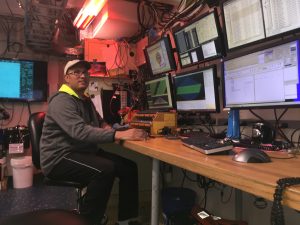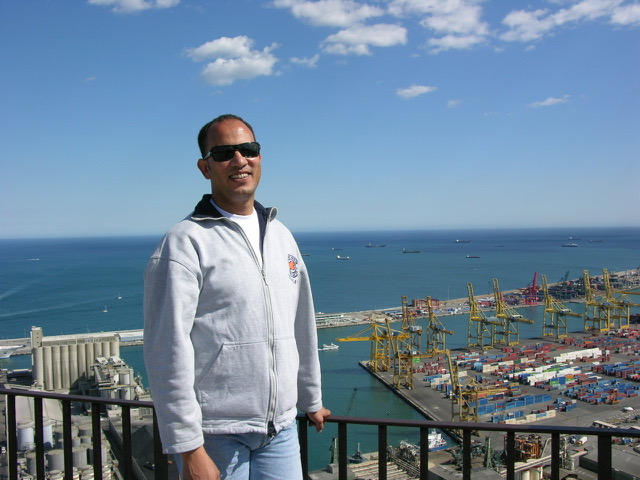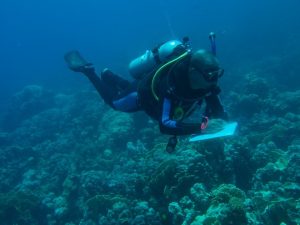A Marine Protected Areas (MPA) manager turned Marine Spatial Ecologist, Ayman has always been passionate about marine conservation, whether in the Red Sea in Egypt or the Great Lakes in the U.S. His time with QLF helped him to become a better manager of the Nabq Protected Area in Egypt, a relatively new MPA at the time. He continues to work towards marine conservation at the National Oceanic and Atmospheric Administration today, mapping the seafloor and performing ecological assessments.
QLF Experiences
Middle East Environmental Education Exchange Program, 1997
A Natural Love for Marine Conservation ~
Growing up in Egypt near the Mediterranean Sea, Ayman Mabrouk feels that “marine conservation…is a part of him”. As a child, he admired the works of French explorer and marine conservationist Jacques-Yves Cousteau and ichthyologist Eugenie Clark, “The Shark Lady”. He loved all things pertaining to the sea. Naturally, he decided to study marine biology, a fairly new field in Egypt at the time, at Suez Canal University, one of the only universities with a field research center on the Red Sea. Ayman’s love for the Red Sea has been a constant in his life—even today, after diving and snorkeling in a wide variety of bodies of water, from the Great Lakes to the Caribbean, Ayman has “never found something like the Red Sea”, with its thriving coral reefs and clear water.

Ayman collecting multi beam data for the NY Bight seafloor 2017 PHOTOGRAPH COURTESY OF AYMAN MABROUK
Ayman currently works as a Marine Spatial Ecologist contractor for the National Oceanic and Atmospheric Administration (NOAA), a position he has held since completing NOAA’s yearlong Sea Grant Knauss Fellowship. As a Marine Spatial Ecologist, he follows his love for exploring the sea, what he “was really dreaming about when he was a kid”, spending time on research vessels in the field, while also collecting data for improved sustainable management of marine resources.
Ayman’s work consists of ecological assessment to characterize critical marine ecosystems, and habitat mapping, collecting data on the seafloor and identifying critical habitats for fish. He recently completed a project that mapped the seafloor of the New York Bight, to gather information for a proposed wind farm, and is now mapping Thunder Bay National Marine Sanctuary in Lake Huron, for decision-makers to better manage the Marine Sanctuary. He also performs ecological assessments, periodic condition reports on the status of marine sanctuaries, and is studying the connectivity of the coral reef ecosystem in the Gulf of Mexico. His scientific findings are “implemented by decision-makers… to either sustainably use these resources or to properly manage these resources”.
From the Red Sea to the Great Lakes ~ Before coming to the U.S. to pursue his h.D., Ayman worked in the field of protected areas management in Egypt. Employed by the Egyptian Environmental Affairs Agency, first as the Manager of Nabq Protected Area, located in the Gulf of Aqaba in the Red Sea, then the Assistant Director for the Nature Conservation Sector.
While working at Nabq Protected Area in 1997, Ayman was invited by QLF to participate in the Middle East Exchange Program as the inaugural Egyptian Fellow. The theme of the Fellowship was environmental education. The Fellows spent a month visiting different NGOs, national parks, and environmental organizations throughout New England. At the time, Nabq was a relatively new protected area and the Exchange provided a foundation for the core of Ayman’s future work in protected areas management, convincing him that successfully involving the local community in conservation and stewardship “it’s all about education, education, education!”.
The Exchange was Ayman’s first visit to the U.S”and it “helped him a lot at the beginning of his career… by exposing him to the external world”. Upon Ayman’s return home to Egypt in 1997, he established the first visitor center in Nabq, using the expertise he had learned on the Exchange. The visitor center worked to highlight both the cultural aspects of the area, namely the local Bedouin culture, as well as the variety of marine environments, such as, mangroves, and seagrasses.
By 2001, Ayman was managing Egyptian Marine Protected Areas (MPAs) throughout the Gulf of Aqaba, while continuing to stress the importance of environmental education. As a well- established expert in MPAs, he began hosting ranger and marine conservation programs in the Sharm El Sheikh training center, teaching best Practices to other rangers and managers. In 2009, Ayman moved to Cairo as a consultant for the Director of the Nature Conservation Sector. His main responsibility was to conduct assessments of protected areas throughout Egypt. During this time, Ayman was designated the mentor of MPA management in Egypt by the World Wildlife Fund (WWF) and the United Nations Environment Programme (UNEP) in a program called MedPAN South, which sought to gather national “mentors” to train MPA managers from their home countries.
Ayman’s career shifted when he left Egypt to pursue his Ph.D. in Fisheries and Wildlife at Michigan State University. His research focus at Michigan State concerned the longitudinal impacts of artisanal fisheries on fish populations.
Upon completing his Ph.D., Ayman received NOAA’s Sea Grant Knauss Fellowship. Following the 2013 Egyptian coup, Ayman relocated his family to the U.S. Although Ayman’s career has shifted from environmental marine conservation education and protected areas management to marine conservation via habitat mapping and ecological assessments, his love for the Red Sea and care for marine habitats remains constant. Whether he is analyzing data from underwater cameras to determine the makeup of the seafloor sediment at NOAA or carrying out the spirit of community-based conservation by working with locals in Egypt to protect the coral reefs in the Red Sea, Ayman works “to better manage and sustainably use natural marine resources”.







